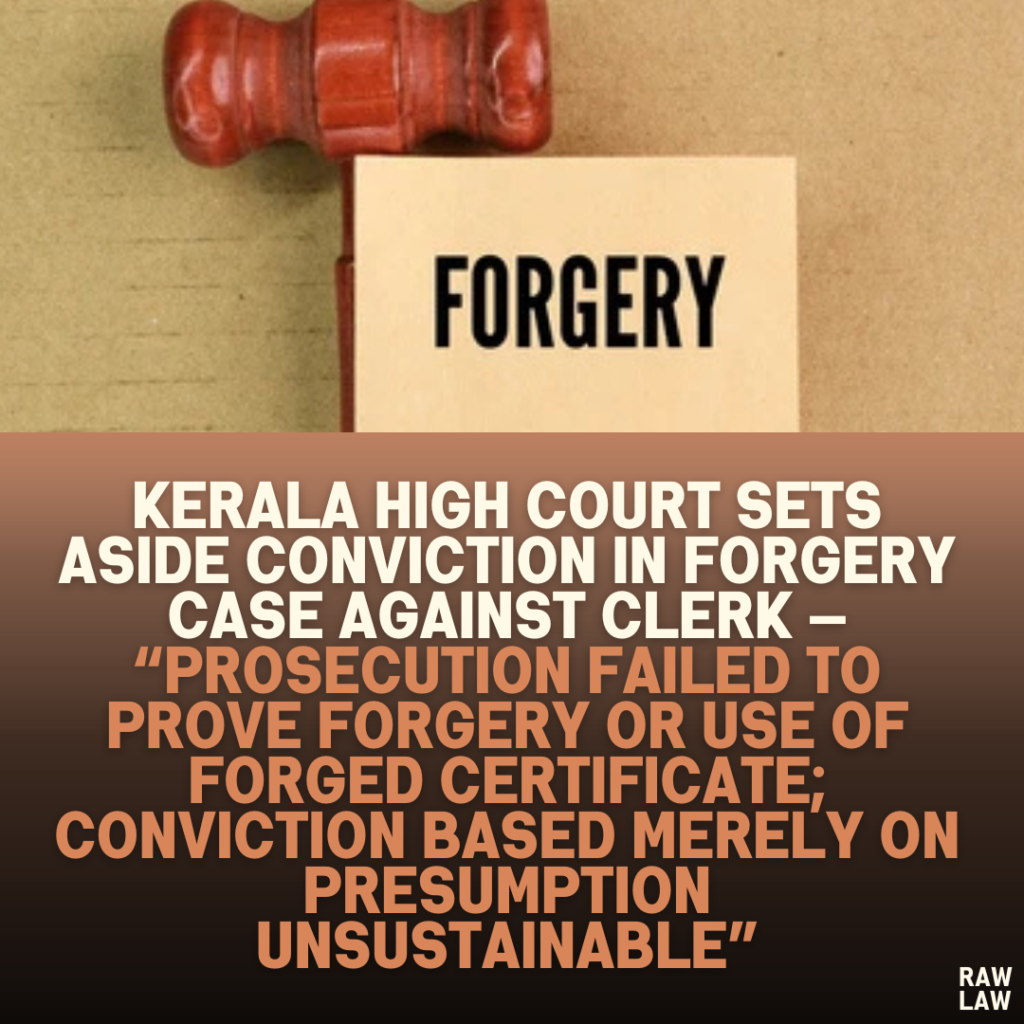Court’s Decision:
The Kerala High Court allowed the criminal revision petition and set aside the conviction and sentence imposed on the revision petitioner by both the trial and appellate courts. The Court held that:
“The trial court as well as the appellate court ought not to have convicted the petitioner in the absence of evidence to show that he had produced Ext.P1 certificate before the Medical Council.”
Finding serious lapses in the prosecution’s case, the Court observed that there was neither proof of forgery nor evidence that the petitioner used the allegedly forged certificate. It directed the refund of 50% of the fine amount deposited during admission of the revision petition.
Facts:
- The petitioner (2nd accused) was tried for offences under Sections 465, 468, and 471 read with Section 34 of IPC.
- The 1st accused, who worked as a Clerical Assistant in the Kerala Public Service Commission (KPSC), allegedly forged a certificate (Ext.P1) claiming the petitioner had passed a departmental test.
- The petitioner, a clerk at the Travancore Cochin Medical Council, was accused of using the forged Ext.P1 certificate before the Medical Council.
- The 1st accused died during the trial; only the petitioner faced the charges.
Issues:
- Whether Ext.P1 certificate was a forged document.
- Whether the petitioner used Ext.P1 as a genuine document before the Medical Council.
- Whether the conviction under Section 471 r/w 465 IPC was sustainable in the absence of proof of forgery and use.
Petitioner’s Arguments:
- The prosecution failed to prove that Ext.P1 was forged.
- There was no evidence showing that the petitioner produced Ext.P1 before the Medical Council.
- The conviction was legally unsustainable due to the absence of direct evidence linking the petitioner to the use of the document.
Respondent’s Arguments:
- The Public Prosecutor contended that there was sufficient evidence to support the conviction under Section 471 r/w 465 IPC.
- It was argued that the High Court, in a revision petition, could not re-appreciate the evidence.
Analysis of the Law:
- Section 471 IPC penalizes the fraudulent or dishonest use of a forged document as genuine.
- For a conviction under Section 471 IPC, the prosecution must first prove that the document is forged and then that the accused used it knowingly.
- The Court emphasized that the burden lies entirely on the prosecution to prove both forgery and the use of the forged document.
Precedent Analysis:
The Court did not cite specific case precedents by name. However, it relied on established principles under Sections 471 and 465 IPC, as well as its revisional jurisdiction under Sections 397 and 401 Cr.P.C., noting:
“The powers vested with this Court under Section 397 r/w 401 of Cr.P.C. are inherent in nature to correct the judgment of the court which suffers from gross illegality.”
Court’s Reasoning:
- No proof of forgery: Though PWs 1, 4, 5, and 6 from KPSC deposed that Ext.P1 was not issued from their office, none had direct knowledge. No scientific examination of the document was undertaken. The Court held that the prosecution failed to prove Ext.P1 was forged.
- No proof of user: The key person alleged to have received Ext.P1 (Registrar Gangadharan Nair) was not examined. PW2 admitted he had no personal knowledge about the petitioner submitting the document.
- Presumption rejected: The lower courts presumed guilt based on the fact that the petitioner was the beneficiary. The High Court held: “The finding…that since the petitioner is the beneficiary…has to be presumed…cannot be accepted.”
- The Court concluded that both the trial and appellate courts erred by convicting the petitioner in the absence of direct or legal evidence.
Conclusion:
- The Kerala High Court found gross illegality and non-appreciation of evidence by the lower courts.
- It exercised its revisional jurisdiction to set aside the conviction and sentence under Section 471 r/w 465 IPC.
- The trial court was directed to refund the fine amount deposited by the petitioner.
Implications:
This judgment reaffirms the principle that:
“Suspicion, however strong, cannot take the place of proof in criminal law.”
It underlines the necessity for the prosecution to establish each ingredient of the offence, especially in forgery-related cases, and restricts courts from convicting solely on presumptions. The ruling also clarifies the scope of revisional jurisdiction under Sections 397 and 401 Cr.P.C., permitting interference where findings are vitiated by gross illegality or misappreciation of evidence.
